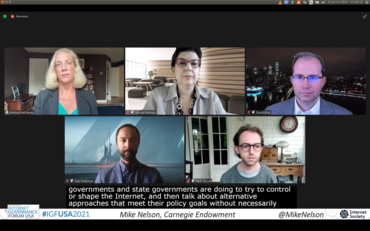Internet fragmentation as a service
 "You spend most of your day telling a robot that you're not a robot. Think about that for two minutes and tell me you don't want to walk into the ocean," the comedian John Mulaney said in his 2018 comedy special, Kid Gorgeous. He was talking about captchas.
"You spend most of your day telling a robot that you're not a robot. Think about that for two minutes and tell me you don't want to walk into the ocean," the comedian John Mulaney said in his 2018 comedy special, Kid Gorgeous. He was talking about captchas.
I was reminded of this during a recent panel at the US Internet Governance Forum hosted by Mike Nelson. Nelson's challenge to his panelists: imagine alternative approaches to governments' policy goals that won't damage the Internet. They talked about unintended consequences (and the exploitation thereof) of laws passed with good intentions, governments' demands for access to data, ransomware, content blocking, multiplying regional rulebooks, technical standards and interoperability, transparency, and rising geopolitical tensions, which cyberspace policy expert Melissa Hathaway suggested should be thought about by playing a mash-up of the games Risk and Settlers of Catan.The main topic: is the Internet at risk of Internet fragmentation?
So much depends on what you mean by "fragmentation". No one mentioned the physical damage achievable by ten backhoes. Nor the domain name system that allows humans and computers to find each other; "splitting the root" (that is, the heart of the DNS) used to dominate such discussions. Nor captchas, but the reason Mulaney sprang to mind was that every day (in every way) captchas frustrate access. Saying that makes me privileged; in countries where Facebook is zero-rated but the rest of the Internet costs money people can't afford on their data plans, the Internet is as cloven as it can possibly be.
Along those lines, Steve DelBianco raised the idea of splintering-by-local-law, the most obvious example being the demand in many countries for data localization. DelBianco, however, cited Illinois' Biometric Information Privacy Act (2008), which has been used to sue platforms on behalf of unnamed users for automatically tagging their photos online. Result: autotagging is not available to Illinois users on the major platforms, and neither is the Google Nest and Amazon Ring doorbells' facility for recognizing and admitting friends and family. See also GDPR, noted above, which three and a half years after taking force still has US media sites blocking access by insisting that our European visitors are important to us.
You could also say that the social Internet is splintering along ideological lines as the extreme right continue to build their own media and channels. In traditional media, this was Roger Ailes' strategy. Online, the medium designed to connect people doesn't care who it connects or for what purpose. Commercial social media engagement algorithms have exacerbated this, as many current books make plain.
Nelson, whose Internet policy experience goes back to the Clinton administration, suggested that policy change is generally driven by a big event: 9/11, for example, which led promptly to the passage of the PATRIOT Act (US) and the Anti-Terrorism, Crime, and Security Act (UK), or the Colonial Pipeline hack that has made ransomware an urgent mainstream concern. So, he asked: what kind of short, sharp shock would cause the Internet to fracture? If you see data protection law as a vector, the 2013 Snowden revelations were that sort of event; a year earlier, GDPR looked like fading away.
You may be thinking, as I was, that we're literally soaking in global catastrophes: the COVID-19 pandemic, and climate change. Both are slow-burning issues, unlike the high-profile drivers of legislative panic Nelson was looking for, but both generate dozens of interim shocks.
I'm always amazed so little is said about climate change and the future of the Internet; the IT industry's emissions just keep growing. China's ban on cryptocurrency mining, which it attributes to environmental concerns, may be the first of many such limits on the use of computing power. Disruptions to electricity supplies - just yesterday, the UK's National Grid warned there may be blackouts this winter - don't "break" the Internet, but they do make access precarious.
So far, the pandemic's effect has mostly been to exacerbate ideological splits and accelerate efforts to curb the spread of misinformation via social media. It's also led to increased censorship in some places; early on, China banned virus-related keywords on WeChat, and this week the Indian authorities raided a newspaper that criticized the government's pandemic response. In addition, the exposure and exacerbation of social inequalities brought by the pandemic may, David Bray suggested in the panel, be contributing to the increase in cybercrime, as "failed states" struggle to rescue their economies. This week's revelations of the database of numbers of interest to NSO Group clients since 2016 doesn't fragment the Internet as a global communications system, but it might in the sense that some people may not be able to afford the risk of being on it.
This is where Mulaney comes in. Today, robots gatekeep web pages. Three trends seem likely to expand their role: online, age verification and online safety laws; covid passports, which are beginning to determine access to physical-world events; and the Internet of Things, which is bridging what's left of the divide between cyberspace and the real world. In the Internet subsumed into everything of our future, "splitting the Internet" may no longer be meaningful as the purely virtual construct Nelson's panel was considering. In the cyber-physical world world, Internet fragmentation must also be hybrid.
Illustrations: The IGF-USA panel in action.
Wendy M. Grossman is the 2013 winner of the Enigma Award. Her Web site has an extensive archive of her books, articles, and music, and an archive of earlier columns in this series. Stories about the border wars between cyberspace and real life are posted occasionally during the week at the net.wars Pinboard - or follow on Twitter.